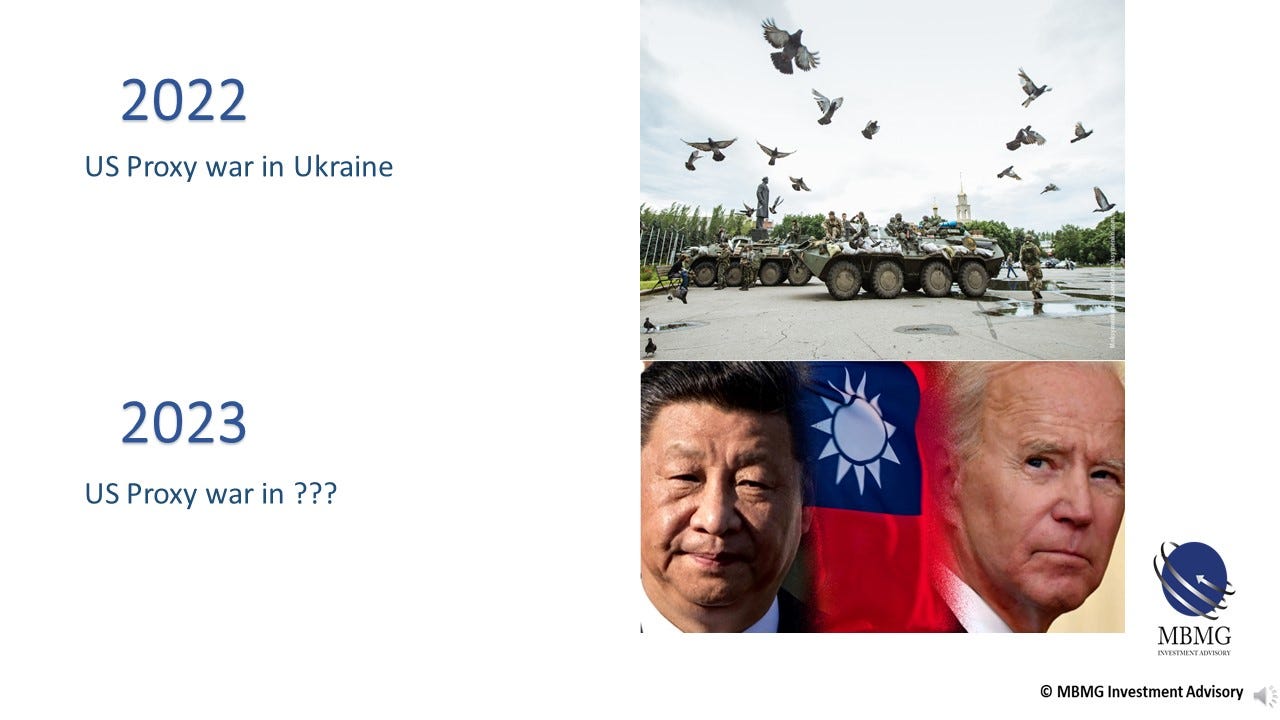Content warning: We plan to send out into the universe our thoughts about 2022 (the year of sensory overload that mercifully seems to be finally heading towards some kind of conclusion) and our concerns about 2023 (the great unknown ahead of all of us).
Here are some of the slides that I have recently used (with varying degrees of irony):
That sounds right to me Albert, but am I supposed to question whether or not that is the important thing?
I’m starting to believe in the horror of my nightmares about 2023, Eleanor - is that the same thing?
I’m with you Leonard, I’m with you….
Geopolitics cast a giant shadow everywhere in 2022 -
With the next US Presidential election not due until the democratically resonant date of Bonfire Night 2024, there’s a real risk that things will get worse before it gets better.
They said "Smile, things could be worse" I smiled. Things got worse. Popular greeting card/t-shirt/poster 'meme' of the last century.....
When I say worse, I’m just thinking of direct consequences such as military conflict, the rising risk of nuclear Armageddon, supply shock inflation, shortages of essentials (such as food and energy) and non-essentials (such as the microchips needed by among other the Mercedes-Benz replacement parts that I’ve been waiting several months for), resource misallocation, economic slowdown, indebtedness, fragile capital markets & climate change denial.
All of these are variously related, partly due to the complex interlinkages of global systems, which we recently touched on.[1]
On a parochial level, my car broke down partly due to the worse than usual flooding this year in Bangkok which is at least in part due to climate change.
The difficulty in getting replacement parts is a supply chain interruption due to a combination of auto-manufacturers’ extreme reliance on tight supply chains combined with misjudgement of whipsawing post-COVID demand for their products. It seems that when car manufacturers belatedly turned up at chip manufacturers with large order books, their places in the queue had been taken by other industries, leaving car companies trying to play catch-up at a time when military procurement elbowed them out of the way.
That’s just a trivial personal example - a more meaningful one of course is global food supply; hindered by climate change, worsened by conflict and ultimately decimated by the deliberate political resource misallocation of sanctions.
A recent article on the online investigative news site Politico [2] claimed that European politicians were accusing the Biden administration of profiting from the conflict in the Ukraine region through ‘sky-high’ energy prices and arms sales, to the extent that the political harmony between America and Europe is clearly coming under increasing threat with more questions are being asked about Europe’s involvement.
‘ “The fact is, if you look at it soberly, the country that is most profiting from this war is the U.S. because they are selling more gas and at higher prices, and because they are selling more weapons” one senior official told POLITICO.’
We’ve been highlighting this concern since the explosion of sanctions, purportedly aimed at imposing economic costs on Russia, but which “unfairly tilt trade away from the EU and threaten to destroy European industries” while benefitting US businesses. Of course, this is happening at the same time that European economies face the threats of spiralling recession, sky-rocketing inflation, painful interest rate hikes and devastating disruptions to energy supplies.
While the American economy also faces some of these largely self-inflicted problems, the US energy sector is getting a major boost from selling natural gas to Europe at almost four times US prices, leading to claims that the Biden administration is overseeing profiteering, or at least European subsidisation of US involvement in the conflict which arguably the Biden administration provoked in various ways (including its opposition to the Nordstream II gas pipeline, one of many Russian casus belli).
It seems to have drawn surprisingly little mainstream comment that the attacks that damaged NS I left NS II still operable and therefore if opposition to NS II hadn’t been so intractable, the winter ahead might not be nearly so bleak for Europe.
More generally, Politico quotes French President Emmanuel Macron as saying that US gas prices were not “friendly” and on Germany’s economy minister as calling on Washington to show more “solidarity” and help reduce energy costs, while Tonino Picula, the EU’s main diplomat charged with maintaining US relations, stated that America is “following a domestic agenda, which is regrettably protectionist and discriminates against U.S. allies" and French Economy Minister Bruno Le Maire has urged the EU to fight back against what he emotively described as potentially genocidal economic isolationism, urging Brussels not to “be the last of the Mohicans”.
The feedback loop of this 4-fold energy cost differential is a huge competitive boost for US industry and is being seen as a factor in businesses choosing to expand, invest or even move operations from Europe to American factories.
Politico claims that American companies have been the largest provider of military aid to Ukraine, (more than $15.2 billion in weapons and equipment), which is already causing the latest wave of supply chain production, especially in electronic chips.
The EuroZone economy is extremely fragile and its ability to compete with US and China may be damaged for many years to come, if not permanently. Many EZ countries are unable to withstand the combined shocks of higher inflation, recession and higher energy costs, potentially for many years to come (transatlantic transported LNG will likley be much more expensive than pipeline gas in perpetuity).
Add to this the burden of the inefficiencies of higher base interest rates, primarily set to suit the German system, being applied across the single currency zone, with the worst-performing sovereigns punished for single currency membership by incurring the premium of ever-widening spreads and this could become a particularly dismal winter for Europe at the beginning of a very challenging future for the EU as the cost of being the main sponsor of Biden’s proxy war in the Ukraine.
Italy, in paricular, of the major economies, looks extremely vulnerable, which goes some way to explaining Italian political turmoil this year.
The economic, political and financial outlook for both Italy and the broader EU each looks extremely fragile for the coming year.
If somehow either or both sail through unscathed, then asset prices right now across equities, property, sovereign bonds and credit may, in hindsight look to have been attractive.
However, not being blessed with 20-20 foresight, in real time, the risks posed by underwriting the Russo-American conflict on the European doorstep don’t yet seem anywhere nearly fully priced into Europe’s outlook and in the meantime, the experiences in the Ukraine seem to have emboldened the Biden administration to look further afield.
Until and unless we see a meaningful reduction in geopolitical tension, this is not a constructive backdrop for investors interested in Europe.
The worst may be yet to come….
[1] https://mbmg.substack.com/p/the-dangers-of-sustaining-unsustainability
[2] https://www.politico.eu/article/vladimir-putin-war-europe-ukraine-gas-inflation-reduction-act-ira-joe-biden-rift-west-eu-accuses-us-of-profiting-from-war/
MBMG Investment Advisory is licensed by the Securities and Exchange Commission of Thailand as an Investment Advisor under licence number Dor 06-0055-21.
For more information and to speak with our advisors, please contact us at info@mbmg-investment.com or call on +66 2 665 2534.
About the Author:
Paul Gambles is licensed by the SEC as both a Securities Fundamental Investment Analyst and an Investment planner.
Disclaimers:
1. While every effort has been made to ensure that the information contained herein is correct, MBMG Investment Advisory cannot be held responsible for any errors that may occur. The views of the contributors may not necessarily reflect the house view of MBMG Investment Advisory. Views and opinions expressed herein may change with market conditions and should not be used in isolation.
2. Please ensure you understand the nature of the products, return conditions and risks before making any investment decision.
3. An investment is not a deposit, it carries investment risk. Investors are encouraged to make an investment only when investing in such an asset corresponds with their own objectives and only after they have acknowledge all risks and have been informed that the return may be more or less than the initial sum.







